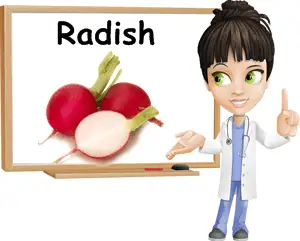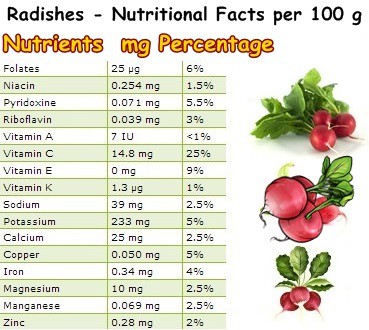Rich in ascorbic and folic acid, vitamins B6 and B9, calcium, potassium and zinc, radishes are a nutritious and versatile vegetable, greatly appreciated in traditional cuisines around the world. Radishes, known by their scientific name as Raphanus sativus, come in a number of varieties. Depending on the season, they can be classified into spring, summer, fall and winter radishes. All of these varieties have different shapes, sizes and colors and can have a more or less pungent flavor and varying nutritional values.
What do radishes look and taste like?
They may be red European radishes, white Asian radishes, pink, black or purple colored. Some varieties are a pink-red color and white at the base, while other varieties are colored differently on the inside compared to the skin color. Most radishes are either round-shaped or elongated. If harvested early, they may have a tender, crisp texture and slightly sweet, yet pungent flavor which only gets stronger with time. Although they are mostly known as root vegetables, meaning that the edible part is the one found underground, some dishes also require the leaves of the plant (also edible), which is why radishes are known as leaf vegetables too.

A popular Chinese proverb says: ‘Eating pungent radish and drinking hot tea, let the starved doctors beg on their knees.’ As you may already know, Chinese traditional medicine has been successfully used for millennia in order to cure a wide range of medical conditions. One would automatically presume there must be some truth to these ancient recommendations. After all, scientific evidence also suggests that radishes are a pretty incredible vegetable.
Nutrition facts and benefits of radishes
With only 16 kcal/100 g, they are a safe choice for anyone struggling to reach their goal weight or maintain a steady weight. But what else should you know about the nutritional value of radishes? First of all, 100 g of radish provides around 25% (that is 14.8 mg) of the daily recommended intake of vitamin C. An incredibly effective antioxidant, vitamin C is the key to a youthful, wrinkle-free complexion because it is a crucial requisite for collagen synthesis, a structural protein that maintains skin elasticity.
Moreover, the vitamin is a potent immune system booster as a result of its antimicrobial and antiviral properties. Research shows vitamin C prevents, reduces and reverses oxidative stress in cells caused by harmful free radical molecules. These effects contribute to lowering inflammation in the body which offers a long-term protection against chronic disease. Moreover, vitamin C strengthens the immune system response and optimizes the immune function.
Studies show white blood cells of the immune system accumulate vitamin C which helps them better perform their roles within the immune system, contributing to a more efficient immune system response (Vitamin C and immune function, published by Ströhle A., in February 2009). T cells and phagocytes are two examples of white blood cells which need vitamin C. T cells are responsible for destroying infected or damaged cells like tumor cells and remembering different pathogens and diseases the immune system has fought in the past in order to deal with future infections and diseases more efficiently. Phagocytes eat infected or damaged cells, clearing infections and preventing disease.

Radishes contain small amounts of B-group vitamins as well: riboflavin, or vitamin B2, niacin, or vitamin B3, pyridoxine, or vitamin B6 and folate, or vitamin B9. B vitamins are known to help synthesize macronutrients from food (carbohydrates, fats and protein), a process which leads to nutrients being absorbed by the intestines and results in boosting energy levels. Moreover, B vitamins help repair DNA, activate other vitamins, maintain skin health and prevent anemia.
B-group vitamins play a key role in a variety of other body functions as well. For instance, they actively support nervous system health as well as contribute to digestive health. For example, vitamin B9 prevents neural tube defects in newborns and supports the normal growth and development of babies in the womb. Vitamin B6 helps synthesize amino acids from protein that improve mood, regulate sleep and appetite.
Radishes also contain small amounts of vitamin E, a great ally for beautiful skin. Vitamin E nourishes it from the inside and helps it retain moisture for a better appearance and more radiance. In addition to this, radishes provide potassium and copper (5% of the RDA), as well as small amounts of iron, calcium, magnesium and manganese, important dietary minerals with incredible health benefits.

Potassium regulates body fluids and blood pressure, while calcium contributes to strong bones and teeth by improving bone density. Iron is highly recommended for people struggling with anemia, while magnesium is essential for calcium absorption in bones and muscle health. Copper boasts antioxidant effects and helps delay premature hair graying and eye discoloration.
It’s good to know that a high intake of calcium combined with low levels of magnesium represent a risk factor for arthritis and osteoporosis. A diet rich in calcium, but low in magnesium may lead to calcium slowly collecting in soft tissues such as joints or heart valves, increasing the risk for arthritis or heart problems. At the same time, this means there is little calcium for bone formation, leading to frail bones and, in time, osteoporosis.
Last but not least, radishes contain isothiocyanates, natural compounds occurring in the Brassicales order that also includes mustard, horseradish, Brussels sprouts, wasabi and watercress. Isothiocyanates have been found to induce programmed cell death in cancer cells (apoptosis), especially in some types of leukemia and melanoma cells that are currently resistant to chemotherapy (for further information on the subject, you can refer to the 2010 September issue of Plant Foods for Human Nutrition).
Also see the benefits of wasabi.
Conclusion
Folk medicine recommends eating radishes for detoxification as it is believed they can help eliminate toxins from the blood. While we all know that the kidneys and liver are in charge of detoxification and do quite an amazing job whether we eat radishes or not, the spicy vegetable is still a good food to eat, objectively speaking. All in all, it can be said that radishes hold therapeutic potential and regular consumption can help improve various aspects of health, from digestion and bowel movement regularity to energy levels, not to mention they bring contributions to skin health, nervous system and immune system function. Because they are a source of rather surprising health benefits, radishes prove to be a great addition to a healthful diet as well as promote good overall health.
